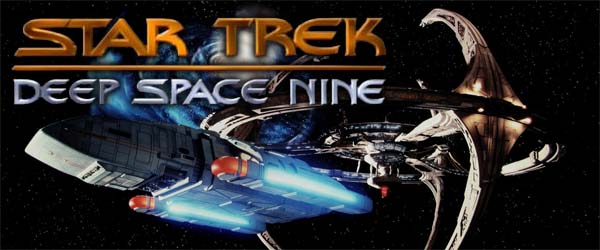
In the age of streaming and binge-watching here in the year 2023, long-form serialized television is now ubiquitous. Every network and streaming service has wanted its own blockbuster TV shows. Whether it's AMC's The Walking Dead and Breaking Bad, HBO's Game of Thrones, Sci-Fi's Battlestar Galactica, Netflix's House of Cards and Stranger Things, History's Vikings, and so forth, it seems that every big new show outside of sit-coms has a heavily-serialized format. Procedural dramas are going the way of the dinosaur.
Serialized, long-form television may be commonplace now, but back in the 1990's, it was virtually unheard of outside of daytime soap operas (such as Dallas and Dynasty) and the occasional network mini-series. At least, this was the case in the United States. British television has a much longer track record of serialized story-telling. A big part of why serialized television was uncommon was that the producer(s) of network syndicacted shows didn't have as much control over when its affiliates decided to air the shows, or how heavily they would market and advertise it. Furthermore, the networks or affiliates could change the time slot of the show pretty much at a whim. Viewership, therefore, would be much more fickle and fractured. Audiences would pop in and drop out. Expecting the audience to have seen every previous episode in preparation for this week's episode was a dangerous and risky expectation for a production studio. It's easy to lose viewers if none of them know what's going on.
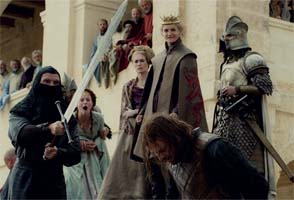 - Game Of Thrones, copyright HBO
- Game Of Thrones, copyright HBO
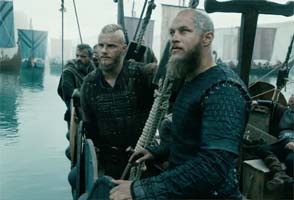 - Vikings, copyright History Channel
- Vikings, copyright History Channel
Highly serialized, long-form drama are the norm for modern networks and subscription television services.
As I mentioned in the previous essay, this was the case with me. I was in elementary school and middle school during DS9's run, and I missed a lot of episodes in the first couple seasons, despite wanting to watch the show. Missing so many episodes meant that I had very little idea what was going on when I would watch, and so I mostly lost interest in the show. If my dad was watching it, and I was there, I'd watch it, but I wasn't planning my day around it.
Looking back now, that sort of serialized story-telling is now ubiquitous and expected, and so it's easier to recognize that Deep Space Nine was truly innovative and ahead of its time in this regard.
Long-form story-telling
Serialized story-telling wasn't alien to Star Trek. Deep Space Nine premiered in 1993, the same year as the sixth season of Next Generation. By this time, The Next Generation had several story threads that had recurred over the course of a season, or over multiple seasons -- as well as several attempted overarching plot threads that were dropped.
As early as the first season of Next Generation, Q had become a recurring antagonist, and his "judgement" over the human race was established as a recurring plot thread. Heck Q's judgement of humanity was originally depicted as the framing mechanism for the entire show! It was scaled back in the following seasons due to the general poor reception of the first season, and the fact that John de Lancie just works better in a more whimsical and comic role.
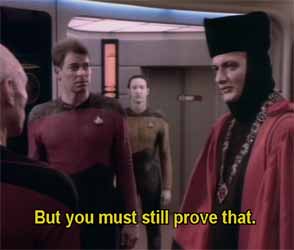 - TNG "Encounter At Farpoint", season 1, episode 1
- TNG "Encounter At Farpoint", season 1, episode 1
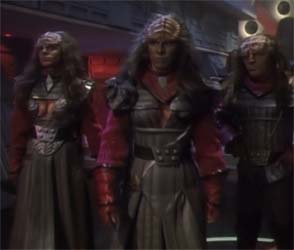 - TNG "Redemption, Part I", season 4, episode 26
- TNG "Redemption, Part I", season 4, episode 26
TNG had several recurring plot threads.
The final two episodes of Next Generation's first season, "Conspiracy" and "The Neutral Zone", seem to have been part of an abandoned attempt at more long-form story-telling. Both seem to be trying to establish some new threat to the Federation (and possibly a shared threat between the Federation and other rival powers such as the Romulans). I think the original idea was for this to become an overarching storyline for the entire series. But the thread from "Conspiracy" was completely dropped, and the destroyed colonies referenced in "The Neutral Zone" were re-written to be retroactive foreshadowing of the Borg's appearance in season 2.
[More]
cddb26c9-ca5a-4327-b199-d0d00dec522b|0|.0
Tags:Star Trek, Star Trek: Deep Space Nine, Federation, Starfleet, progressivism, humanism, secularism, religion, fundamentalism, fascism, terrorism, war, trans-gender, Worf, Odo, Quark, Moogie, Ishka, Bajor, Dominion, Founder, Changeling, Jem'Hadar, Cardassian, streaming television, Game of Thrones, Battlestar Galactica, the X-Files, Babylon 5, Buffy the Vampire Slayer, The Sopranos, Lost, Twin Peaks
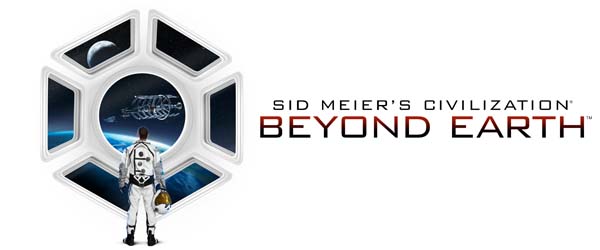
I started writing this post months ago (back in 2015, I think) - long before I had any inkling of the impending release of Civilization VI. This post may be entirely moot now that Civ VI has been announced, and it seems unlikely to me that Beyond Earth will see further expansions. However, I still want to present these ideas, so I've re-written this post to be less speculative and more retrospective. Even if these ideas aren't fated to be implemented for Beyond Earth, it's still an opportunity to look at a way in which the game could have differentiated itself from Civ V, and they could serve as a template for future Civ titles (maybe even Beyond Earth 2) or for modders. Maybe I'll even mod it in myself if I get time and motivation.
Civilization: Beyond Earth really struggled to separate itself from Civ V. The expansion, Rising Tide takes steps to address this with some of its new gameplay mechanics and revised diplomatic engine. Sadly, these efforts don't really address one of the underlying, fundamental, disconnects that the game has with me:
"One of the things that bothered me about Beyond Earth was the way that the victory conditions create an unnecessary competition between the different civs. Aren't we all just colonists from the same earth who are supposed to be trying not to repeat the mistakes of the past? Aren't we trying to preserve the human race? Without the various civs starting the game with any sort of pre-established ideology or agendas, there's no reason for them to be competing with one another. Without a genuine shared victory, there's also no systems in place to share your colonial success with your fellow colonies. The net effect is that once you've defeated the challenge of taming the planet and [one way or another] eliminating the aliens as a threat to your expansion, then the rest of the game is a competition between civs to be the first to reach any of the [mechanically satisfying and varied, yet intellectually vapid] victory conditions."
- from my Rising Tide review
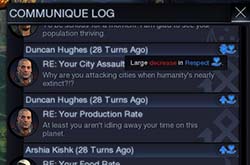
Heck, why are we competing to begin with?
Despite being mechanically different from Civ V's victory conditions, Beyond Earth still fell into the trap of being fundamentally, unnecessarily tribalistic and competitive. I don't know if this is supposed to be some kind of sad, fatalist message that Firaxis is writing into Beyond Earth: that we are doomed to repeat the mistakes of the past. This isn't Fallout. I hope that Firaxis' designers aren't that cynical, and that it was an unintentional emergent consequence of design.
This may seem like a small, trivial, superficial issue, but it's not. Regular Civilization is easy to buy into because it's based [loosely] on established history and uses real-world characters and states that most people are already familiar with. Buying into the theme of Beyond Earth is just so much harder because there's so much of the game that just doesn't make sense, or which doesn't really follow from the opening cinematic or the game's flavor text. This is why Alpha Centauri went to such great pains to personlize the leaders, and to turn them into charicatures of established real-world ideologies and standard sci-fi tropes. These are factions with established goals and agendas that we can understand, and we can buy into their conflicts. Beyond Earth doesn't have that, and so not only do its leaders fall flat as characters unto their own, but the entire basis upon which the game's core conflicts and victory conditions are based start to fall apart as well.
In any case, I think that one of the best ways that Beyond Earth could have truly separated itself from Civ V (mechanically and thematically) would have been to change the competitive nature of the victories and introduce truly cooperative victories, or maybe even a "players versus map" victory type. And I want to emphasize from the start that I haven't put nearly as much time into Beyond Earth as I have into Civ V. I'm by no means an "expert" in the game. So feel free to take the following suggestions with a grain of salt. I admit that these ideas simply might not work, but I still think that it's worthwhile to explore the possibility space that this game could have offered... [More]
41c56220-e572-46c7-b911-40df5b0b6ab2|1|5.0
Tags:Sid Meier's Civilization, Civilization: Beyond Earth, Civilization: Beyond Earth: Rising Tide, Firaxis, 2K Games, PC, Steam, strategy, grand strategy, turn-based strategy, science fiction, space, victory, cooperation, alliance, harmony, purity, supremacy, contact, first contact, domination, board game, Battlestar Galactica, Pandemic, Arkham Horror, Mansions of Madness, Descent: Journeys in the Dark
When Star Trek was rebooted by J.J. Abrams in 2009 and brought the franchise into mainstream popularity, it was a bitter-sweet moment for many long-time fans. On the one hand, Abrams had made Star Trek "cool" for the first time in the franchise's history and ensured that Star Trek would continue to live on since it's future following the cancelation of Star Trek: Enterprise and the bombing of Star Trek: Nemesis was uncertain. On the other hand, the movie was a reset that took place in a new Star Trek continuity that essentially erased the more than 40 years of Star Trek history. Long-time fans suddenly had to deal with the possibility that the timeline (as it originally existed) was over. There would likely never be any further development of the original Star Trek continuity, since all future projects would probably be based on Abrams' reboot.
Star Trek, as it originally existed, seemed dead.
This meant that the only likely outlets for extension of the original continuity would come from novels, comic books, and the craptacular Star Trek Online MMORPG computer game. And since Star Trek canon generally only includes official, on-screen material, none of those sources would be considered truly canonical.
This would mean that many Trek fans might have some very serious questions about the future of their beloved series go unanswered... [More]
3d3cb6db-cd87-4813-848a-b8e66b4901f6|2|4.5
Tags:Star Trek, Gene Roddenberry, science fiction, CBS, Paramount, David Foster, 1947 Entertainment, Bryan Singer, J.J. Abrams, Roberto Orci, Star Trek Online, Enterprise, Battlestar Galactica
|

| 12 | | | | | | | 60 | | 11 | | | | | | | 55 | | 10 | | | | | | | 50 | | 09 | | | | | | | 45 | | 08 | | | | | | | 40 | | 07 | | | | | | | 35 | | 06 | | | | | | | 30 | | 05 | | | | | | | 25 | | 04 | | | | | | | 20 | | 03 | | | | | | | 15 | | 02 | | | | | | | 10 | | 01 | | | | | | | 05 |
|